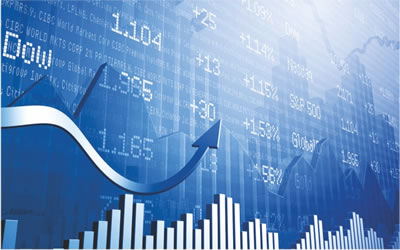Across the world, the impact of the novel coronavirus is still severe despite the ease of lockdown for economic reasons. The uncertainty continues to heighten and no economy is spared from the fall-out from the COVID-19 outbreak. Many African capital markets are bearish, Namibia, South Africa, Mauritius, Egypt, Morocco, Kenya, Ghana, Malawi, and a few others. In Nigeria, the first quarter of the year 2020, in terms of performance, closed in the red with a negative return of (20.65%), as against a negative return of (1.24%) in the first quarter of 2019. The market capitalization of the Nigerian Stock Exchange (NSE), which represents the market value of all listed companies, lost about N2 trillion in the first quarter of 2020. However, surprisingly the performance of the stock market in April 2020 was positive. The market performed with a gain of 8.08 % to close the month of April at 23,021.01 points, from an opening level of 21,300.47 points at the beginning of the month. In terms of market capitalization for the period, the value was up by N896 billion as at April 30, 2020, from an opening value of N11.101 trillion on April 1, 2020, to close at N11.997 trillion. In May 2020, the market on month-on-month performance closed at 9.76% as against +8.08% gain recorded in April 2020. The performance hinged higher due to investors bargain hunting even though most of the trades were executed remotely.
This surprising feat in Nigeria particularly during the COVID19 pandemic could be attributed to smart investors bargain hunting and the release of good end-of-the-year financial results by some of the listed companies along with improved dividend declarations in recent time. During this period some of the companies that released their financials are MTN Nigeria Communications Plc, Vitafoam Nigeria Plc, Dangote Cement Plc, Julius Berger Nigeria Plc, Nigerian Breweries Plc, Zenith Bank Plc, Transcorp Hotels Plc, United Bank for Africa Plc, Transnational Corporation of Nigeria Plc, Guaranty Trust Bank Plc, Stanbic IBTC Holdings Plc, Access Bank Plc, Fidelity Bank Plc, Sterling Bank Plc, Seplat Petroleum Development Company Plc, 11 Plc, Dangote Sugar Plc, BUA cement Plc Total Plc, Airtel Plc Nestle Nigeria Plc, First Bank, Okomu Oil Plc, and BOC Gases Plc.
Nonetheless, the increasing number in the incidences of coronavirus (COVID-19) in Nigeria has been a huge concern. It could signal weak economic data, reduced productivity, and falling consumption rate, which might even affect the overall outputs and performance of the economy eventually. This projection is largely due to the global negative impact of coronavirus (COVID-19) pandemic on the economy, the weak inflow of foreign portfolio investments, high uncertainty in the economy, and owing to intense selling pressure occasioned by investors’ apathy in the capital market. Already the COVID-19 outbreak has forced a slow or halt in the physical operations of some businesses and that could heighten in the coming months.
The Nigerian Stock Exchange has been operational through remote trading with technology playing a significant role in the operations. Likewise, companies have also adopted effective usage of technology to work remotely and mitigate the risk of total business shut down. With the current realities, the next normal way to carry on business activities effectively in the meantime is through remote communications. Technology has the potential to still improve business efficiency and also improve transactions for businesses to perform, while this COVID-19 disruption persists. The big question is internet data bundle cheap to sustain this efficiency? Agreeably, this is a different argument which is out of the context of this article.
Nonetheless, despite the promotion of technology adoption to ease business transaction in the meantime, the outbreak of the novel coronavirus (COVID-19) so far in Nigeria has been a bad indicator of economic performance and the capital market as a whole. The level at which the coronavirus spread exponentially can result to damage consumption, purchasing power and services, and even investment decisions among investors. Consequently, if the spread is not curtailed within a reasonable period, it might harm the inflow of foreign direct investments, imports and export trades, manufacturing, tourism, health, hospitality, services, travels and more than likely it might disrupt or crash the economic forecasts and revenue estimates of many businesses particularly SMEs in the country. This pandemic might eventually impact negatively on the performance of the Nigerian Stock Exchange (NSE) and that of many of the listed companies, given the high uncertainty around production, services, and demands if the COVID-19 continues to spread.
Rather than see the market perpetually closing on negative notes, adequate government policy response is recommended to immediately cushion the effect of the pandemic. Though it is still too early to measure the full economic impact of COVID-19 on the capital market in Nigeria, however, the early signs do not look good. Regulators in the capital market, as a matter of urgency need to propose to government, direct policy responses to cushion the effect of the COVID-19. This is imperative because most of SMEs and companies listed have experienced supply chain disruption and depressing investment climate. Therefore, government intervention or palliative is required for their sustainability.
As part of an effort to reduce the negative impact of COVID-19 in the country, especially the disruption of regular activities and economic instability the capital market and the market operators can be assisted by the government. The suspension of the proposed July 1, 2020, increase in electricity tariffs across the country by the electricity distribution companies (Discos) is recommended to ease the negative impact of COVID-19.
That said, the policy responses by the Nigerian government can further be reviewed to accommodate fiscal palliative measures and economic stimulatory measures targeted at the capital market to ameliorate the impact on the economy especially to save businesses, professionals and capital market operators. Measures such as tax deferrals, tax holidays from States, and Federal Inland Revenue Services (FIRS), reduction in interest rates on all Central Bank of Nigeria (CBN). intervention facilities and relaxation of the stringent requirements is advised. Further to this,the approval of extension on moratorium on Federal Government funded loans, through Bank of Industry (BOI), Bank of Agriculture (BOA), and Nigeria Export-Import Bank (NEXIM Bank). Nigeria Communication Commission can be considered.
The Nigerian Communication Commission (NCC) can look into the downward review of the internet data cost to sustain business usage, especially for remote trading and e-commerceneeds. Allocation of Contingency and crisis intervention funds to subsidies salaries of some private establishment that has been badly affected by COVID19 pandemic in health, maritime, education sectors to mitigate the massive unemployment spike in the country.
Furthermore, technical proposals should be considered from the capital market professionals and operators for the expression of measures to help their businesses and stem the tide of COVID-19 impact. The joint development of comprehensive policy for market sustainability and recovery where applicableby government and the capital market professionals is recommended at this time. This will in no small measure minimize the impact of the pandemic in the capital market landscape and stimulate the economy at large. It will also attract more capital market participation and encourage more listing on the exchange, which in turn will provide market liquidity.
The real subject matter for the government and other economic policymakers is to see that the virus is short-lived in Nigeria. Consequently, the performance of the Nigerian capital market will be significantly influenced by how the government can quickly address the COVID-19 pandemic.
It is imperative to state that the capital market can always support economic growth if the needed policies are put in place.Currently, Nigeria majorly depends on crude oil foreign revenue to have a stable economy and this revenue expectation has been dashed due to global shocks. This lull and weakening of the economy also affect the performance of the listed companies on the Exchange and the capital market as a whole. Therefore, to mitigate the negative impact and to response to the COVID-19 consequences, a government intervention is necessary.
On the part of the regulators to deepening market participation, it is recommended that necessary support be given to large firms, SMEs including government agencies to list. Securities and Exchange Commission (SEC) and Nigerian Stock Exchange (NSE) should relax the listing requirements to accommodate more qualified companies to list on the Nigerian Stock Exchange. More so, the lowering of transaction and listing costs will directly attract more listings and deepen market participation.
Point of note is that the co-operation and co-ordination between and among the various financial markets regulators SEC,NSE CBN, Pension Commission (PenCom), Debt Management Office (DMO)and National insurance Commission(NAICOM) need to be strengthened to assure coherent of policies. Therefore, the post-COVID-19 regulatory regime should involve consistent and coordinated policy responses and pronouncement from these regulators and agencies to create considerable effective implementations, which will in turn boost market confidence.
I foresee a return of foreign investors when a bit of stability and flattening of the curve of the pandemic has been achieved globally particularly in Nigeria. Besides, regulators and government need to improve policies and laws to promote foreign investors and inward foreign direct investments (FDIs) because it will eventually stimulate economic development. The policy of ease of doing business in Nigeria can be upgraded to include foreign portfolio investment policy options. Furthermore, Foreign Direct Investment (FDI)-incentives (tax-related) to considerably increase foreign participation in our capital market ecosystem needs to reflect in the Post-COVID recovery policy.
In conclusion, equities are grossly undervalued at current prices; most stocks are far below their real worth and book value. Also, the current valuations already offer opportunities to those who want to position for the long term. Essentially, hedging against inflation is achievable with the current equity prices if held over in the long term.
Dr. Olubiyi, wrote via drtimiolubiyi@gmail.com
YOU SHOULD NOT MISS THESE HEADLINES FROM NIGERIAN TRIBUNE
No NEC Meeting Will Hold On Thursday ― Ajimobi-Led APC Faction
Senator Abiola Ajimobi-led faction of the All Progressives Congress (APC) on Tuesday dismissed reports that a meeting of the APC National Executive Committee (NEC) will hold at the Presidential Villa on Thursday… Read Full Story
Edo Poll: INEC Worried Over Conflicting Court Orders, Litigations
The Independent National Electoral Commission (INEC) has expressed worry at the spate of litigations, conflicting court orders ahead of the Edo State governorship poll, warning that such was harmful to the smooth conduct of primaries and the September 19 poll at large… Read Full Story
Ghanaian President Apologises Over Demolition Of Nigeria’s High Commission Building
President Nana Akufo-Addo of Ghana on Tuesday spoke with President Muhammadu Buhari, expressing his sincere apology for the demolition of a building on the premises of Nigerian High Commission in Accra… Read Full Story
APC, PDP Scramble For Yoruba Land
THERE is a gradual buildup to replicatiing the 2003 scenario that existed in the South-West. It will be recalled that the ruling Peoples Democratic Party (PDP) from May 29, 1999, had mustered all resources towards routing the Alliance for Democracy (AD), the main opposition party from Yoruba land. Leading the PDP forces … Read Full Story
If Igbo Don’t Get Presidency In 2023… —Ezeife
I want to restate my position clearly. Nobody will just dash anybody the presidency. As it is, there is a rotation for north/south. So far, the north has dominated the presidency. But it has come to the south too. The west from the south has produced president. The South-South from the south has produced president… Read Full Story






